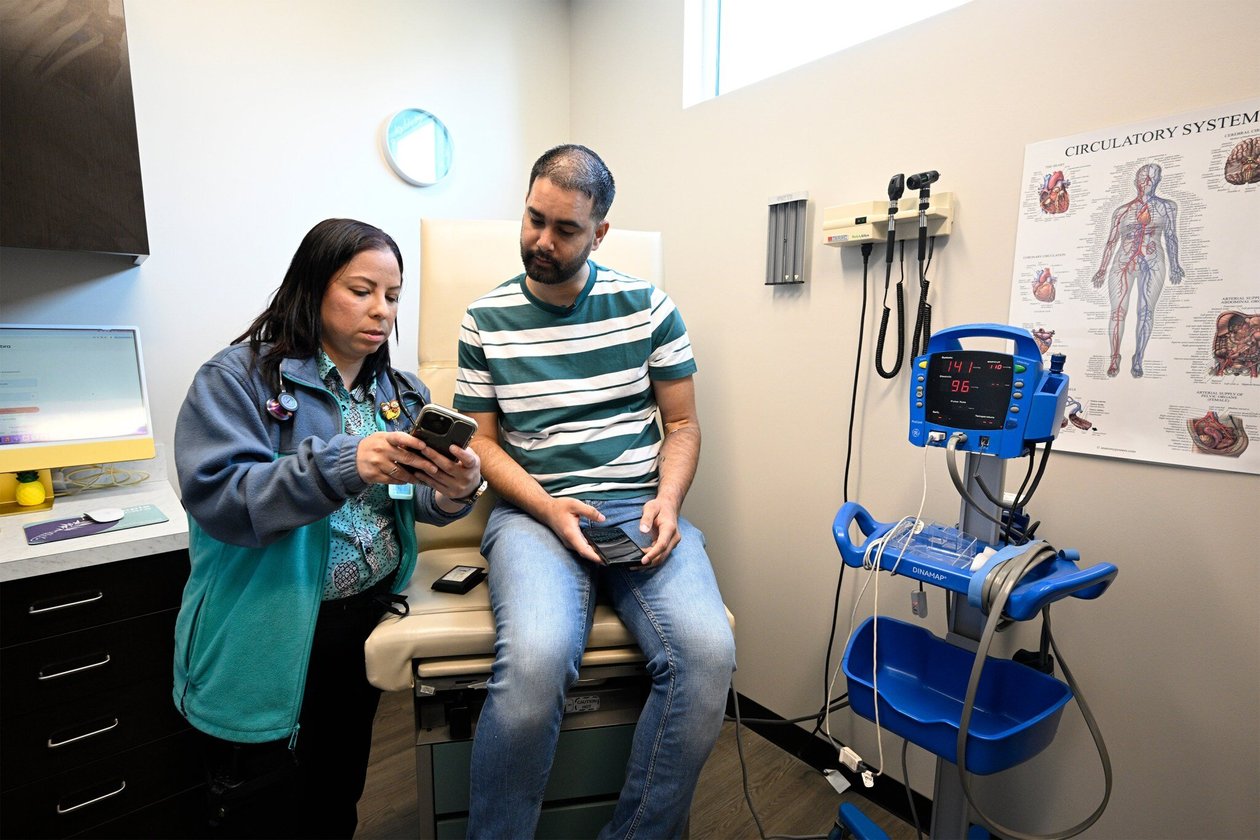| Not a subscriber? Sign Up | Thursday, June 27, 2024
Visit KFF Health News for the latest headlines | Health Care Costs | BILL OF THE MONTH It's Called an Urgent Care Emergency Center — But Which Is It? 
| (LAURA BUCKMAN FOR KFF HEALTH NEWS) | By Renuka Rayasam One evening last December, Tieqiao Zhang felt severe stomach pain. After it subsided later that night, he thought it might be food poisoning. When the pain returned the next morning, Zhang realized the source of his pain might not be as "simple as bad food." He didn't want to wait for an appointment with his regular doctor, but he also wasn't sure if the pain warranted emergency care, he said. Zhang, 50, opted to visit Parkland Health's Urgent Care Emergency Center, a clinic near his home in Dallas where he'd been treated in the past. It's on the campus of Parkland, the city's largest public hospital, which has a separate emergency room. He believed the clinic was an urgent care center, he said. A CT scan revealed that Zhang had a kidney stone. A physician told him it would pass naturally within a few days, and Zhang was sent home with a prescription for painkillers, he said. Five days later, Zhang's stomach pain worsened. Worried and unable to get an immediate appointment with a urologist, Zhang once again visited the Urgent Care Emergency Center and again was advised to wait and see, he said. Two weeks later, Zhang passed the kidney stone. Then the bills came. Read more here. ••• Medical Debt Biden Administration Advances Plan To Remove Medical Debt From Credit Scores
By Noam N. Levey
The Consumer Financial Protection Bureau proposed federal regulations that would prevent unpaid medical bills from being counted on consumers' credit reports. Los Angeles County Approves Medical Debt Relief for Residents
By Molly Castle Work
The most populous county in the U.S. is buying up and retiring millions of dollars in residents' medical debt as part of its plan to tackle a $2.9 billion burden. But some health experts worry the initiative could incentivize hospitals to pursue debtors rather than boost financial assistance to patients. Super Bowl Parade Shooting Survivors Await Promised Donations While Bills Pile Up
By Peggy Lowe, KCUR and Bram Sable-Smith
Families of the people hurt during the Feb. 14 mass shooting are carrying what one expert calls "victimization debt." In the third story of our series "The Injured," we learn about the strain of paying small and large medical bills and other out-of-pocket costs. ••• Health Care Costs Battleground Wisconsin: Voters Feel Nickel-and-Dimed by Health Care Costs
By Angela Hart
In the swing state of Wisconsin, the cost and availability of health care have emerged as key issues. Voters there say prescriptions, procedures, and health insurance policies are too expensive, and must be addressed by the next president, whether Republican or Democrat. Biden Plan To Save Medicare Patients Money on Drugs Risks Empty Shelves, Pharmacists Say
By Susan Jaffe
President Joe Biden is campaigning for reelection on his efforts to cut costs for Medicare patients at the pharmacy counter. But independent pharmacists say one strategy makes it unaffordable for them to keep some brand-name medicines in stock. ••• Insurance Presidential Election Could Decide Fate of Extra Obamacare Subsidies
By Andy Miller
Most states that saw enrollment in the Obamacare marketplace double from 2020 to 2024 are in the South. But the enhanced federal subsidies that attracted people with $0 premiums and low out-of-pocket costs will expire next year. Biden's on Target About What Repealing ACA Would Mean for Preexisting Condition Protections
By Jacob Gardenswartz
A Biden campaign ad highlighting how an Obamacare repeal would affect people with preexisting conditions is mostly true. A Tale of Two States: Arizona and Florida Diverge on How To Expand Kids' Health Insurance
By Daniel Chang
Both Florida and Arizona want to expand eligibility for the Children's Health Insurance Program, known as CHIP, but their approaches to charging low-income families premiums for the coverage showcase the nation's ideological divide on helping the disadvantaged. ••• Doctor Shortage Funding Instability Plagues Program That Brings Docs to Underserved Areas
By Michelle Andrews
A medical residency program designed to train future primary care physicians in outpatient rather than hospital settings has proved an effective means to bring doctors to rural and underserved areas. But it hinges on unpredictable congressional funding. ••• Internet Subsidies End of Pandemic Internet Subsidies Threatens a Health Care Lifeline for Rural America
By Sarah Jane Tribble
As the Affordable Connectivity Program runs out of money, millions of people face a jump in internet costs or lost connections if federal lawmakers don't pass a funding extension. ••• HIV/AIDS 
| | (AP PHOTO / PHELAN M. EBENHACK) | Young Gay Latinos See Rising Share of New HIV Cases, Leading to Call for Targeted Funding
By Vanessa G. Sánchez and Devna Bose, The Associated Press and Phillip Reese
Since being diagnosed with HIV in 2022, Fernando Hermida has had to move three times to access treatment. A KFF Health News-Associated Press analysis found gay and bisexual Latino men account for a fast-growing proportion of new diagnoses and infections, showing they are falling behind in the fight against HIV. Americans With HIV Are Living Longer. Federal Spending Isn't Keeping Up.
By Sam Whitehead
Advances in medicine mean more people are living longer with HIV. But aging with HIV comes with an increased risk of health complications, and many worry the U.S. health care system isn't prepared to treat this growing population. ••• California California Leaders Tussle With Health Industry Over Billions of New Dollars for Medi-Cal
By Bernard J. Wolfson
Gov. Gavin Newsom wants to pull funds earmarked for new investment in Medi-Cal to help plug California's $45 billion deficit. A state budget passed June 13 by the legislature largely endorsed Newsom's plan. Voters could settle the matter in an industry-backed initiative that has qualified for the November ballot. California Becomes Latest State To Try Capping Health Care Spending
By Bernard J. Wolfson
California is the ninth state to set annual health spending targets for the industry. Already hospitals and doctors are voicing resistance to the fledgling Office of Health Care Affordability, even as they avoid overtly opposing its goals. California Lawmakers Preserve Aid to Older, Disabled Immigrants
By Vanessa G. Sánchez
Lawmakers passed a budget that rejected Gov. Gavin Newsom's proposal to save nearly $95 million by eliminating in-home support services for qualifying older, blind, and disabled immigrants lacking legal residency. Advocates say Newsom's plan would have cost more in the long run. Newsom has not indicated whether he'll veto. Watch: California Pays Drug Users To Stay Clean
KFF Health News senior correspondent Angela Hart discusses a state Medicaid experiment for people addicted to methamphetamine, cocaine, and other stimulants. For every clean urine test, they can earn money — up to $599 a year. ••• Podcasts An Arm and a Leg: Meet the Middleman's Middleman
By Dan Weissmann
Why are patients facing bigger bills than they expect for out-of-network care? In this episode of "An Arm and a Leg," the show explains the hidden mechanics of MultiPlan, a data firm that helps health insurers set these rates and make bigger returns. An Arm and a Leg: Medicaid Recipients Struggle To Stay Enrolled
By Dan Weissmann
In this episode of "An Arm and a Leg," the show takes its first look at Medicaid. The program has dropped more than 22 million people since spring 2023, when covid-era protections ended. KFF Health News' 'What the Health?': Anti-Abortion Hard-Liners Speak Up
While Republican candidates in many states downplay their opposition to abortion, the most vehement wing of the movement, which helped overturn Roe v. Wade — those who advocate prosecuting patients, outlawing contraception, and banning IVF — are increasingly outspoken. Meanwhile, some state legislatures continue to advance new restrictions, like a proposal moving in Louisiana to include abortion medications mifepristone and misoprostol on the list of the most dangerous drugs. Alice Miranda Ollstein of Politico, Rachel Roubein of The Washington Post, and Joanne Kenen of the Johns Hopkins schools of public health and nursing and Politico Magazine join KFF Health News' Julie Rovner to discuss these stories and more. Also this week, Rovner interviews Shefali Luthra of The 19th about her new book on abortion in post-Roe America, "Undue Burden." ••• KFF Health News on Air Journalists Discuss Abortion Laws, Pollution, and Potential Changes to Obamacare Subsidies
KFF Health News and California Healthline staff made the rounds on national and local media to discuss topical stories. Here's a collection of their appearances. Journalists Talk Cost of Weight Loss Drugs and Lack of Obesity Doctors to Manage Their Use
KFF Health News and California Healthline staff made the rounds on national and local media to discuss topical stories. Here's a collection of their appearances. ••• From Our Readers Readers Issue Rx for Clogged ERs and Outrageous Out-of-Pocket Costs
KFF Health News gives readers a chance to comment on a recent batch of stories. | | | | | |
Comments
Post a Comment